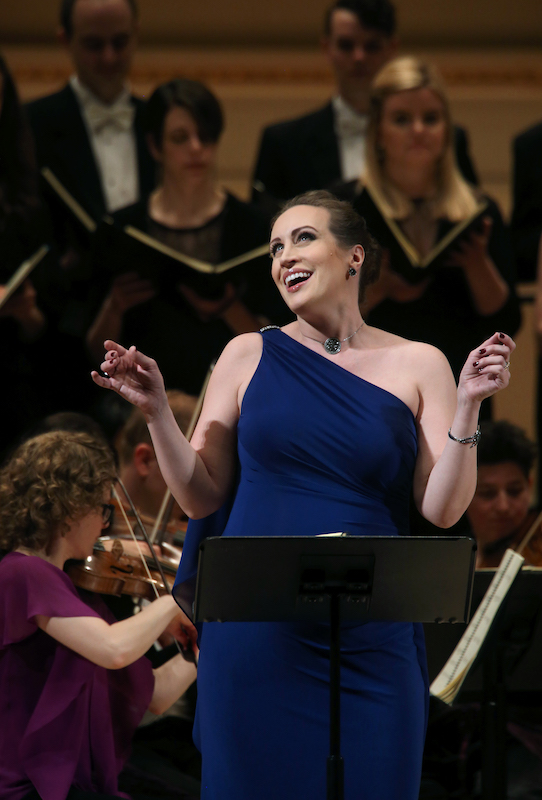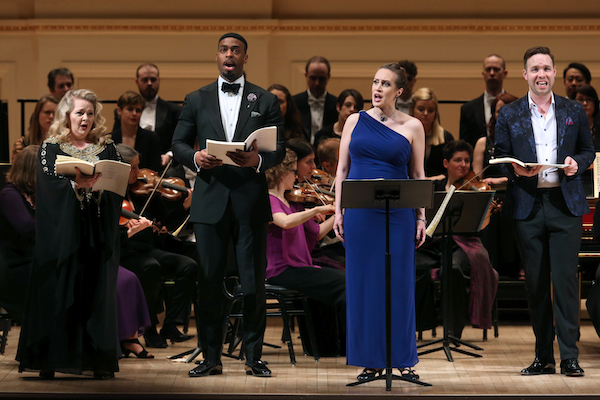Bicket, English Concert and fine cast make a strong case for Handel’s “Semele”

Brenda Rae sang the title role in Handel’s “Semele” with The English Concert, conducted by Harry Bicket Sunday at Carnegie Hall. Photo: Steve J. Sherman
Sunday afternoon at Carnegie Hall saw an appearance by celebrities of the Baroque performance movement, Harry Bicket and the English Concert. With period instruments and superb singers, their concert performance of Handel’s Semele was a textbook example of how historical practice can refresh a well-worn piece.
First performed in 1744, Semele is nominally an oratorio, but functionally an opera: a dramatic piece in three acts, with a plot driven by the clashes of its characters and no narrator. Loosely based on classical myth, the scenario begins as the title character’s wedding is broken off due to her ongoing affair with Jupiter. Jealous, Juno appears to Semele in the form of her sister Ino, and convinces her to compel Jupiter to reveal his true form—which kills the mortal Semele instantly. A relatively tidy narrative exhorting us all not to reach above our station, Handel’s Semele stretches out to nearly four hours.
In the title role, Brenda Rae offered a cool, clear soprano: a bright instrument, if a little small. There was a liquid ease to her singing all afternoon, with coloratura and trills that flowed seamlessly. Rae also boasts a warm soft voice, which she showed off especially in “O sleep, why dost thou leave me,” a quiet aria of gentle, climbing phrases. Overall, hers was a tart reading of the role, with a sharp confidence coming through in the vocal fireworks of “Myself I shall adore.”
Benjamin Hulett played Jupiter as a rakish, all-powerful dandy, sporting a rich caramel tenor. His is not the bright, light sound of a leggiero tenor, and he struggled in faster arias, pushing to reel off running passages without a natural coloratura. Yet on the whole his singing was gorgeous, a warm voice of medium weight with a hint of shine on the top, which he showed off in the sighing aria “Where’er you walk.”
The standout of Sunday’s singers was mezzo Elizabeth DeShong, doubling as Semele’s sister Ino and Juno, Jupiter’s oft-betrayed queen. The voice she brought to her dual role was spectacular, dark in its middle, with a thundering chest. This is an instrument of enormous weight, so it was astonishing to hear her navigate her many running passages so nimbly. Juno’s “Hence, Iris, hence, away” showed her in all her fierce, regal fury, contrasting the burning power of her chest voice with dazzling coloratura.

Elizabeth DeShong, Solomon Howard, Brenda Rae and Christopher Lowrey in Handel’s “Semele.” Photo: Steve J. Sherman
A strong ensemble rounded out the cast: Christopher Lowrey, playing Athamas, Semele’s betrothed, showed a firm if somewhat wiry countertenor, with a remarkable consistency of tone all the way through. As Semele’s father Cadmus and the sleep-god Somnus, Soloman Howard brought his cavernous, colorful bass, showing a subtle, rough grain.
Ailish Tynan offered comic relief with her stage antics as Iris, and matched them with a full, dark soprano. Brian Giebler, in his deus-ex-machina cameo as Apollo, sang with a light, pleasing tenor, while bass Joseph Beutel sounded a little cloudy as the Priest presiding over Juno’s rites at the opening.
The star of the day, even with so much excellent singing, was the English Concert itself: period ensembles can often feel choked by their own fastidious approach, but this ensemble’s playing bloomed, executing the score with perfect clarity. Under Bicket’s direction, there was a constant grace in their playing, and buoyancy in their sound.
The Clarion Choir was no less impressive, glowing brightly in Handel’s choral writing. Only about thirty voices, Clarion is small enough that a listener can hear the details of individual voices mixing together, but they had no trouble generating enough volume to fill Carnegie’s main hall.
The only real blemish on the afternoon was no fault of the performance, but in the piece itself. There is ingenious and affecting writing in Handel’s music, and William Congreve’s libretto has snatches of brilliant poetry. In a concert performance, however, it feels endless, dragging through a dénouement that takes nearly twenty minutes, an anticlimactic ending for an otherwise splendid performance.
Posted Apr 15, 2019 at 3:56 pm by CastaDiva
These performances by Harry Bicket and the English Concert are an annual treat, with talented young casts and that wonderful ensemble of musicians. This was a very impressive performance by all, and yes, DeShong was outstanding. Not only did she dazzle with her rich mezzo, she acted with verve and mischief, esp. in the scene with Semele where, through the magic mirror, she convinces Semele that she is now as beautiful as a goddess, thus paving the way for her destruction.
The final Act was indeed rather long, but given the excellence of the performance, who cared?